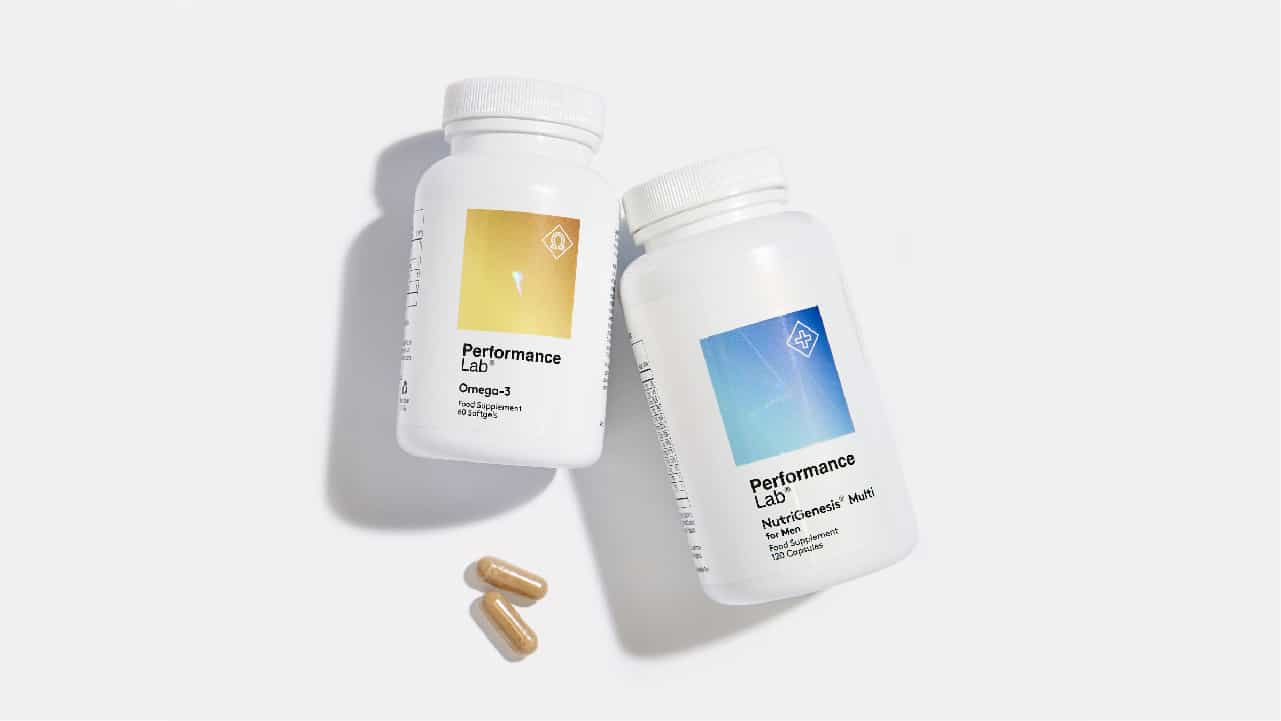Vitamin C and omega-3 fatty acids are two nutrients that play critical roles in the body.
Whether for brain health, immune function, inflammation, or structural support, consuming enough of these guys is essential - literally and figuratively, as the body can’t produce them, so they must come from the diet.
And while most multivitamins that contain vitamin C don’t contain omega-3s, you may be someone who knocks back all of these supplements in one go to avoid forgetting.
But if you’re someone who separates your vitamins for fear of interactions, we have good news: vitamin C and omega-3s are safe to supplement together. You may even want to ensure you’re taking them at the same time! Why? We’ve got all the details right here. However, it is important to consult a healthcare professional before starting any new supplement regimen.
We’ll break down each nutrient, why they’re essential, and the benefits of supplementing vitamin C and omega-3 together.
The Basics Of Vitamin C Ascorbic Acid

Abundant in all sorts of fruits and vegetables—along with a host of skincare serums and anti-aging products—vitamin C, also known as ascorbic acid, is a powerful water-soluble micronutrient and a critical component of the diet.
From reducing signs of aging to improving cholesterol levels, studies have found a long list of health benefits, from the inside out, associated with this nutrient. Vitamin C is involved in protein metabolism, immune health, collagen synthesis, iron absorption, heart health, and can interact with certain drugs to enhance their efficacy and reduce side effects.
It has numerous functions in the human body, many of which are attributed to its powerful antioxidant properties and, therefore, its ability to protect cells from free radicals and prevent oxidative stress.
It’s also needed to produce other compounds like neurotransmitters and L-carnitine. 1, 2 Although widely available in food sources, it’s estimated that roughly 15% of US adults don’t get enough. So many people choose to supplement to prevent a deficiency —and because vitamin C demands increase during illness or stress.
Health Benefits Of a Higher Vitamin C Intake
So, why is vitamin C so important? Here's an overview of what we'll dive into:
- Improves heart health
- Boosts non-heme iron absorption
- Protects cells against free-radical damage
- Enhances brain function
- Supports immune health
Protects cells against free-radical damage
Antioxidants are compounds capable of neutralizing free radicals to protect cells and prevent disease; diseases like atherosclerosis and cancer may occur in part due to oxidative damage to tissues. 3
As an electron donor and powerful antioxidant, vitamin C helps prevent the buildup of free radicals in the body, which may offer protection against disease. Additionally, vitamin C can mitigate the adverse effects of oxidative stress, protecting against damage to the liver and kidneys.
Studies consistently show that a diet high in fruits and vegetables is linked to a lower risk of cardiovascular disease, stroke, cancer, and increased longevity. 3

Improves heart health
Your heart is essential to overall health and well-being and works tirelessly to provide your cells with oxygen and nutrients daily. Adding more vitamin C into your diet may protect your heart against heart disease.
One review found that 500 mg of vitamin C daily significantly decreased LDL cholesterol and triglyceride levels. 4 A similar study found that a higher intake of vitamin C was linked to a lower risk of death from stroke or coronary heart disease. 5
Boosts non-heme iron absorption
Vegans and vegetarians are at an increased risk of iron deficiency and iron deficiency anemia, as non-heme iron is not as bioavailable as heme iron.
However, pairing non-heme iron or an iron supplement with vitamin C can maximize absorption. One study found that just 100 mg of vitamin C alongside an iron-rich meal increased iron absorption by a massive 67%. 6
Enhances brain function
Some research shows that vitamin C can benefit cognitive health and support healthy aging.
One study found that serum concentrations of vitamin C are lower in people with dementia and that a higher intake of antioxidants like vitamin C could prevent or slow cognitive delay in older people. 7, 8
Another study found that vitamin C supplements paired with vitamin E decreased the risk of developing Alzheimer's. 9
Supports immune health
Immune health is one of the most well-known benefits of vitamin C, and loading up on vitamin C-rich foods can strengthen your body's immune defense during cold and flu season.
Studies show that meeting the RDI for vitamin C daily can reduce symptoms and shorten the duration of respiratory tract infections like the common cold. 10
It can also help decrease the incidence of other conditions like pneumonia, malaria, and diarrhea. It also supports faster wound healing. 11
What You Need To Know About Omega-3s
Chances are you’ve heard about omega-3s concerning fish oil. If you haven’t, let us enlighten you.

Omega-3s are a type of polyunsaturated fatty acid that contains one double bond in the structure at the third carbon—the omega “3” denotes where the first double bond is; omega-6s, for example, have the double bond at the sixth carbon. Unlike saturated fatty acids, which the body can produce, it doesn’t have the enzyme needed to put the double bond in the right place. In other words, your body can’t make them, so they must come from diet or supplementation. Omega-3s are essential to overall health, as they’re incorporated in many parts of the body, like cell membranes, to regulate membrane viscosity, and play an important anti-inflammatory role. They’re also essential for fetal development, brain health, and aging. 12
And because EPA and DHA are precursors for several metabolites that are potent lipid mediators, studies have considered them to prevent or treat many diseases, and their interactions with drugs like methotrexate, omega-3, and vitamin C have shown potential benefits. 13 There are four types of omega-3s common to foods, two of which offer greater benefits than the others:
Alpha-linolenic Acid (ALA)
A plant-based short-chain omega-3 that can be converted into longer-chained EPA and DHA. However, the process is relatively inefficient; less than 10% is converted into EPA/DHA. 14
Eicosapentaenoic Acid (EPA)
EPA is a 20-carbon fatty acid found in cold-water oily fish, algae oil, and krill oil. Your body can synthesize EPA in its original form. EPA and DHA offer the most health benefits of all omega-3s.
Eicosatetraenoic Acid (ETA)
ETA is a largely unknown 20-carbon omega-3 fatty acid found in roe oil and green-lipped mussel. It's anti-inflammatory and can inhibit your body's production of the inflammatory omega-6 fatty acid, arachidonic acid (ARA).
Docosahexaenoic Acid (DHA)
A 22-carbon fatty acid also found in oily fish, krill oil, algae oil, and fish oil supplements. DHA can be converted back to EPA to maintain balance if too much DHA is consumed.
But omega-3s are so popular because most people consume an inordinately skewed ratio of inflammatory omega-6s to anti-inflammatory omega-3s, which is a breeding ground for disease.
So, for your body to function optimally and maintain health, you need a proper balance between omega-3s and omega-6s. Most modern diets contain a ratio closer to 20:1 or 30:1 ratio of omega-6 to omega-3 fatty acids.
Health Benefits Of Omega-3 Fatty Acids
Promotes heart health

Heart health is one of omega-3s most known benefits thanks to its ability to protect against heart disease and stroke, the two leading causes of death worldwide.
Evidence is largely mixed on omega-3s and cardiovascular stroke or heart attack risk. Still, there is a lot of positive research linking a higher intake of omega-3s to better cardiovascular health outcomes, including 15, 16
- Lowers triglyceride levels
- Balances cholesterol
- Prevents plaque build-up
- Reduces blood pressure
- Reduces metabolic syndrome symptoms
- Prevents blood clots
Support cognitive health
DHA is one of the most abundant fats in the human brain and is essential for cellular membrane fluidity, function, and neurotransmitter release. 17
Research shows that getting enough omega-3s in the diet is key to maintaining cognitive health and preventing cognitive decline and other age-related issues. 18 EPA and DHA may also be helpful for:
- Depression and anxiety
- ADHD
- Schizophrenia
- Bipolar disorder
- Alzheimer's disease
- Age-related mental decline
Reduces inflammation
The anti-inflammatory properties of omega-3 fats give them many of their characteristic benefits. Studies show that increasing your omega-3 intake could decrease systemic inflammation, the root cause of many chronic diseases. 19
How? Changing the fatty acid composition of cells involved in the inflammatory response affects the production of inflammatory mediators (adhesion molecules, cytokines, etc.) and, therefore, the cells involved in inflammation and their function. 20 Other benefits associated with omega-3 fatty acids include:
- Preventing and treating autoimmune diseases
- Reducing the risk of cancer
Age-Specific Benefits of Vitamin C and Omega-3s

For Children and Adolescents
- Brain Development: Omega-3 fatty acids, notably DHA, are crucial for the brain and eye development in infants and children. Research indicates that higher intake of Omega-3s can lead to improved attention and cognitive function providing a solid foundation for learning and development during these critical years.
- Immune Support: Vitamin C plays a pivotal role in bolstering the immune system of children, helping to shorten the duration and lessen the severity of colds. This is especially important for school-aged children who face higher exposure rates to infections.
For Adults
- Mental Health and Cognitive Function: Adults may experience the mood-stabilizing benefits of Omega-3s, associated with decreased prevalence of depression and anxiety. Additionally, the antioxidant properties of Vitamin C can help mitigate oxidative stress and enhance mood, contributing to overall mental well-being.
- Cardiovascular Health: The heart health benefits of Omega-3 fatty acids and Vitamin C include lowering blood pressure, reducing triglyceride levels, and improving lipid profiles, which are crucial for adults at risk of heart disease, promoting long-term cardiovascular resilience.
- Skin Health: Vitamin C's critical role in collagen production aids in diminishing wrinkles and improving skin texture, making it an indispensable nutrient for adults concerned with maintaining youthful, healthy skin.
For Pregnant Women
- Fetal Development: The importance of Omega-3 fatty acids, especially DHA, extends to the neurological and visual development of the fetus. Adequate DHA intake is recommended for pregnant women to support fetal brain development and reduce the risk of premature birth.
- Immune System Support: Vitamin C supports pregnant women in warding off infections and may decrease the risk of prenatal complications. Its role in tissue repair and wound healing is particularly beneficial postpartum, ensuring a healthier recovery.

For the Elderly
- Cognitive Decline: Omega-3 fatty acids may slow down cognitive decline in older adults and potentially reduce the risk of Alzheimer's disease. Alongside, Vitamin C's antioxidant properties support brain health, which may lower the risk of dementia.
- Joint Health: The anti-inflammatory effects of Omega-3s are advantageous for the elderly by alleviating symptoms of arthritis and enhancing joint mobility, thereby improving quality of life.
- Immune Function: Aging is associated with a decline in immune function. Vitamin C is crucial for older adults to maintain a healthy immune system, potentially reducing the duration and severity of illnesses.
Vitamin C And Omega-3s: 3 Reasons To Combine Them
Antioxidant + anti-inflammatory power duo
When it comes to maintaining health and preventing disease, antioxidants and anti-inflammatories are where it’s at.
Antioxidants like vitamin C protect cells and tissues from oxidative damage by free radicals, preventing unwanted inflammatory responses.
However, because inflammation is a normal process, it can happen—and that’s where anti-inflammatories like omega-3s come in handy.
When inflammation occurs, they help dampen the response and prevent it from becoming chronic or systemic. It is important to be aware of potential drug interactions when combining these supplements.
Promotes heart health
The heart is the center of your body—without a well-functioning and healthy heart, things just aren't going to work. And protecting it starts with diet. Vitamin C and omega-3s are both powerful compounds to safeguard the heart.
Vitamin C's antioxidant properties help inhibit cholesterol oxidation, thereby reducing the incidence and protecting against atherosclerosis. 21
A higher vitamin C intake has also been linked to improved lipid profiles, arterial stiffness, and endothelial function. However, all of its protective mechanisms aren't fully understood.
Studies suggest that omega-3s, on the other hand, specifically EPA and DHA, help to improve plaque stability, decrease endothelial activation, and improve vascular permeability, which decreases the risk of experiencing a cardiovascular event. 22 Together, they're a heart-healthy power duo that protects your cardiovascular system.
Supports cognitive function
Looking for a sharper memory? Better attention? Clearer thinking? Vitamin C and omega-3s might be your newest double-stack. DHA is heavily concentrated in the brain and preferentially taken up over other fatty acids. 23
Low levels of brain DHA are associated with cognitive decline, impaired learning, and the onset of sporadic Alzheimer's disease. Infant brain development is also heavily dependent on adequate intake of omega-3s.Vitamin C plays an important role as an antioxidant in the brain, but it's also essential for other key functions, acting as a co-factor for several enzyme reactions, including catecholamine synthesis, collagen production, and regulation of HIF-1α. 24
As such, vitamin C is essential for mood via glutamatergic, dopaminergic, cholinergic, and GABAergic transmission, as well as high levels of oxidative stress and acting as a potential therapeutic agent against ischemic stroke, Alzheimer's disease, Parkinson's disease, and Huntingdon's disease.
So, where can you find this power duo?

Try Performance Lab NutriGenesis Multi paired with Performance Lab Omega-3. It's the ultimate stack for reducing inflammation, boosting brain power, and keeping your cells healthy and powerful.














